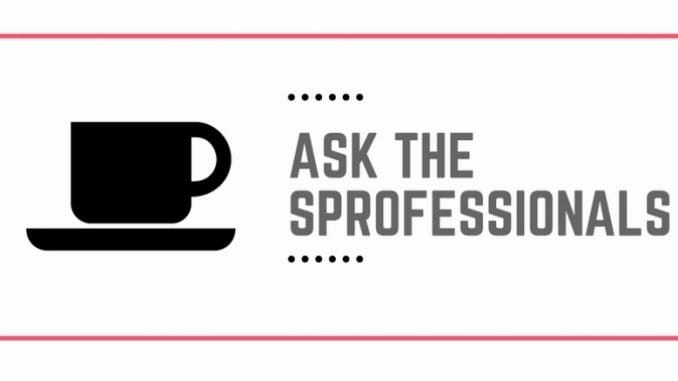
In this series, seven industry experts sound off on issues around café policy, breaking down the ins and outs of how policy affects morale and retention.
BY RJ JOSEPH
SPECIAL TO BARISTA MAGAZINE
We’re bringing “Ask the Sprofessionals” back! This post is part of a series where we ask pros about big questions in coffee. If you want to go back and read more, check out Volume 1, Volume 2, Volume 3, Volume 4, and Volume 5.
Volume 6—The Sprofessionals on Romantic Relationships in the Workplace
Today, a panel of veteran coffee pros lend their expertise to a complex and controversial subject: romantic relationships in the workplace.
Romantic relationships are complicated, and they’ve been known to happen in any and all environments, no matter what rules govern them. So what types of policies create the safest, smoothest workplaces despite humans being human? Is it better to try to impose more rules or fewer? Is it better to go case by case, or craft rules that apply no matter the situation?
The Sprofessionals are here to help break down the pros and cons of various relationship policies.
The Question: What types of policies create the healthiest situations around romantic relationships in the workplace? Should policies be loose and informal, or written and official?
Umeko Motoyoshi, head of coffee, Sudden Coffee
“I think that when we talk about relationship policies, we need to examine what we are trying to prevent. Having a relationship policy that’s specific and clear is absolutely necessary, and thinking through specific concerns about specific outcomes should be clearly included in other policies.
So if you’re thinking, I don’t want people making out at work, include that in your sexual harassment policy. If you’re thinking, I don’t want people getting promoted because they’re dating the boss, then that needs to be addressed in policy around how promotions happen and how salaries and raises are determined. Sexual harassment policies should also cover situations where there’s someone in a position of power who is having a sexual relationship with someone they manage and abusing that relationship and that power.
The idea that coworkers shouldn’t date is just unrealistic. It happens. It’s uncomfortable to admit, but what do we do when that happens? You have to remain curious and open instead of making assumptions, and you have to think through the inherent risks and create policy based in preventing those specific outcomes.”
Jasper Wilde, coffee educator, Ritual Coffee Roasters
“If there is no official written policy, the boss at that time gets to call the shots, and results can change from month to month or from year to year. Even though I’ve worked with multiple policies under different companies, people still generally seem to have relationships in the same way. Most people start in secret and then share openly when they are more serious or are ready. No specific policy has had any effect on the workplace relationships that I’ve seen.
At one large company I used to work for, the policy was that you could date your coworker but could not work in the same store with them. For me, I used the rule to disclose my relationships only when I was ready to move stores. That policy was very difficult for people who were married to other employees; they would have to work at different stores and sometimes, like in rural Texas, stores were 20 or 30 miles apart. There was sometimes tension when a couple didn’t have enough resources to disclose their relationship to management. This meant that they had to keep quiet about it because neither one could afford to move stores even when they wanted to be open about the relationship. This dragged down morale, especially when other coworkers knew and had to keep the secret as well.
At Ritual, the policy is go ahead and date, just don’t let it affect your work. No accommodations are made to the schedule at Ritual if there is tension in a relationship, romantic or platonic. My ideal policy would probably be what Ritual has: You may date your coworker, just don’t let it affect your work.”
Kim Elena Ionescu, chief sustainability officer, Specialty Coffee Association
“First, whatever your relationship policy is, put it in writing. You can come back to it if you want to revise it, but please formalize it and publicize it.
In general, I’d want to be friendly to workplace relationships not only because I met my partner at work, but also because I feel like policies forbidding romantic relationships in the workplace are an expression of the capitalist valuation of human beings in terms of our capacity for industrial production output. Like, we’re supposed to cease to feel for the eight hours we’re at work and not explore anything beyond the scope of our assigned task as an employee. Don’t get me wrong—I don’t think it’s an employer’s responsibility to provide for every need of the individual worker and their family—but it seems like the employer ultimately benefits more from strict policies than individuals do, even if individuals are sometimes protected, as well.
I’m comfortable with policies that leave open the possibility of romantic relationships between coworkers while simultaneously protecting the working relationship of the direct manager/employee that carries the most risk (for both the individuals and the organization). My impression is that policies that try to prevent relationships end up feeding a culture of secrecy and distrust.”
Cimara Dunn, director of education, Quills Coffee
“Policies are absolutely necessary in order to protect your employees. One place I worked went years without a written policy. The company grew, and when an issue did arise, it snowballed from a saga of small moments and behaviors that each could have been shut down with a policy. Instead, the surrounding employees and guests were made to feel uncomfortable for far longer than was acceptable before a tangible line was crossed. Romantic relationship policies are closely related to harassment policies; it’s important to offer your employees a safe space where they feel they will be taken seriously.
I’ve worked in places with no policy, places with only a supervisor/employee policy, and a place that discouraged relationships altogether—a bad and silly idea. I have worked with my partner for several years, and regularly work with other couples. More important than policy is the expected level of accountability, integrity, and professionalism in the workplace in general. Policies are a tool, but they alone won’t build a healthy company culture.
I’ve yet to experience a system that is foolproof, but I appreciate policies that give descriptions of how an ideal employee should represent their company while working, as there are fewer gaps to exploit. In addition, I would recommend basing members of a relationship at different locations if possible, prohibiting any same-café supervisor/employee relationship, explicitly rejecting nepotism, and reinforcing the sexual harassment policy.”
Shannon, consultant/event producer, Just Shannon Presents
“Having a lack of policy coupled with a lack of management often leads to problems. Love happens and it is fantastic when it does. Having a policy where management sits down with the couple and without judgment crafts a plan to keep the two scheduled separately is ideal. I think the most effective types of policies are those ensuring that romantic partners are not scheduled for shifts together, and that one never manages the other.”
The Takeaways:
- Craft an on-paper policy and revise as needed.
- Popular policies include preventing supervisor-employee relationship and preventing shared locations/shifts/departments.
- In addition to having clear, written, relationship policies, amp up your sexual harassment, salary/promotion, and on-shift conduct policies to include specific outcomes that you’re afraid of.
- Trying to prevent relationships altogether usually does more harm than good.
This is an online partner piece for our print piece, “Relationships in the Workplace: How to Create Policies that Work,” in the February + March 2018 issue of Barista Magazine. Do you agree with the Sprofessionals? Leave your take in the comments section.
 ABOUT THE AUTHOR
ABOUT THE AUTHOR
RJ Joseph roasts coffee and writes a blog called Queer Cup in addition to her other adventures in coffee journalism. Her writing focuses primarily on equity, workers’ rights, and alternatives to the status quo. In her free time she loves cooking, reading, and being in Oakland, Calif. You can follow her on Instagram and Twitter.

